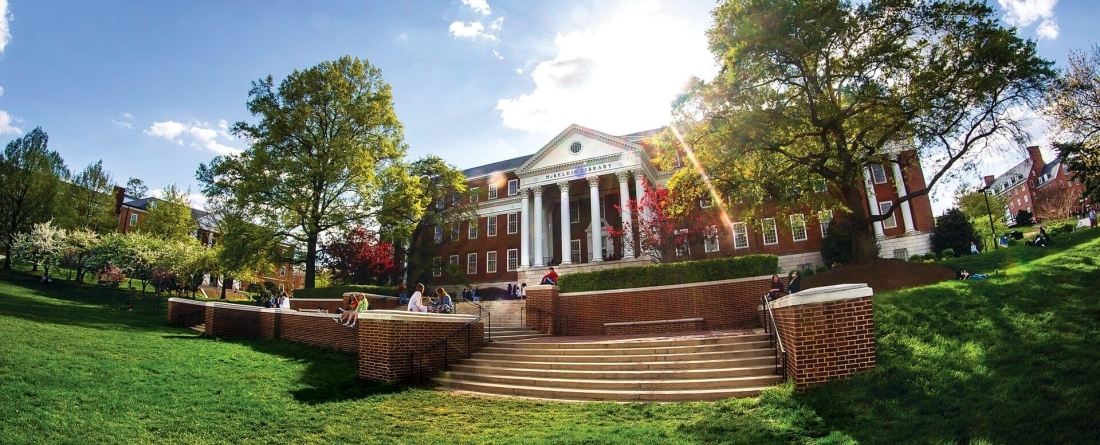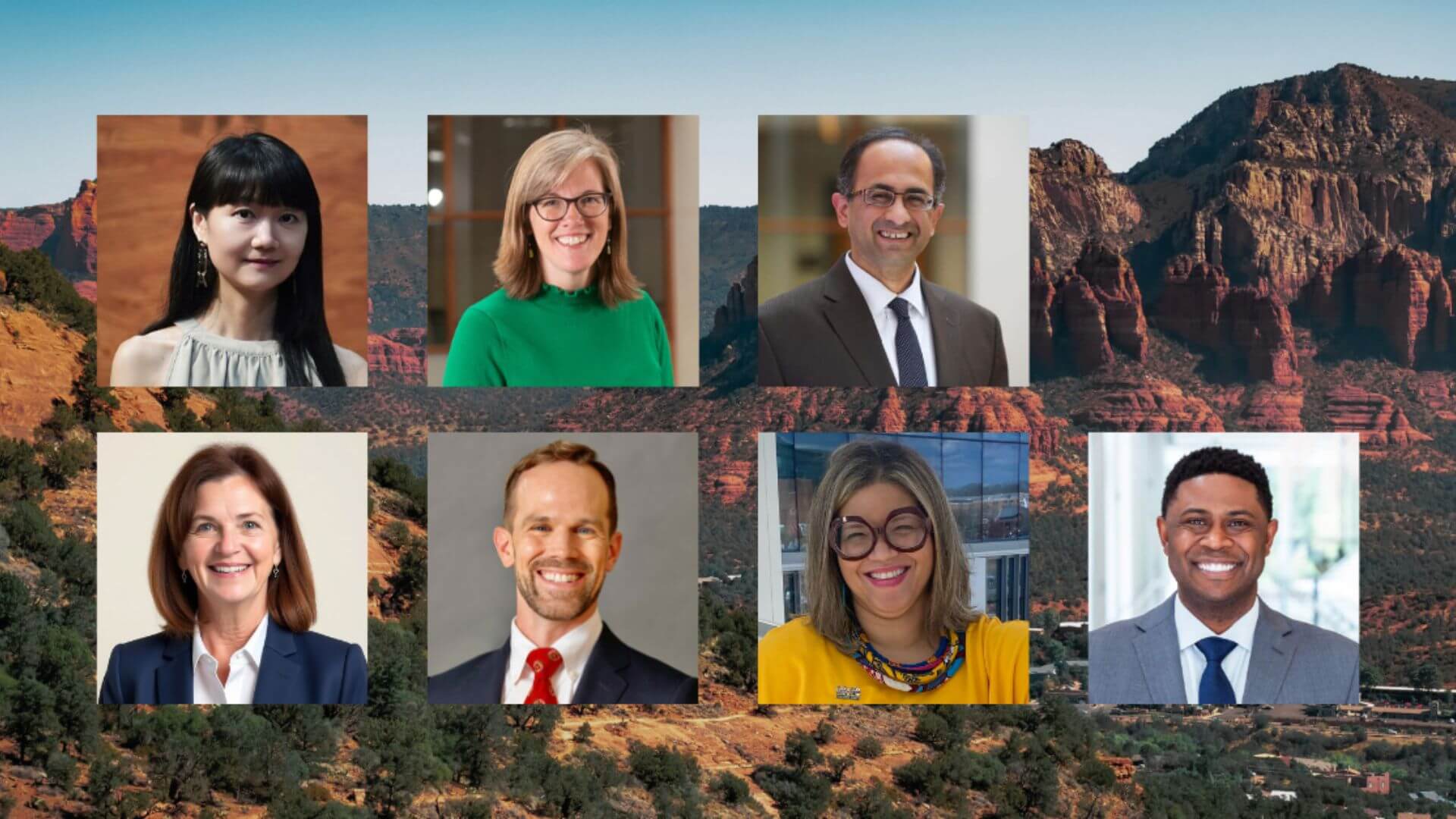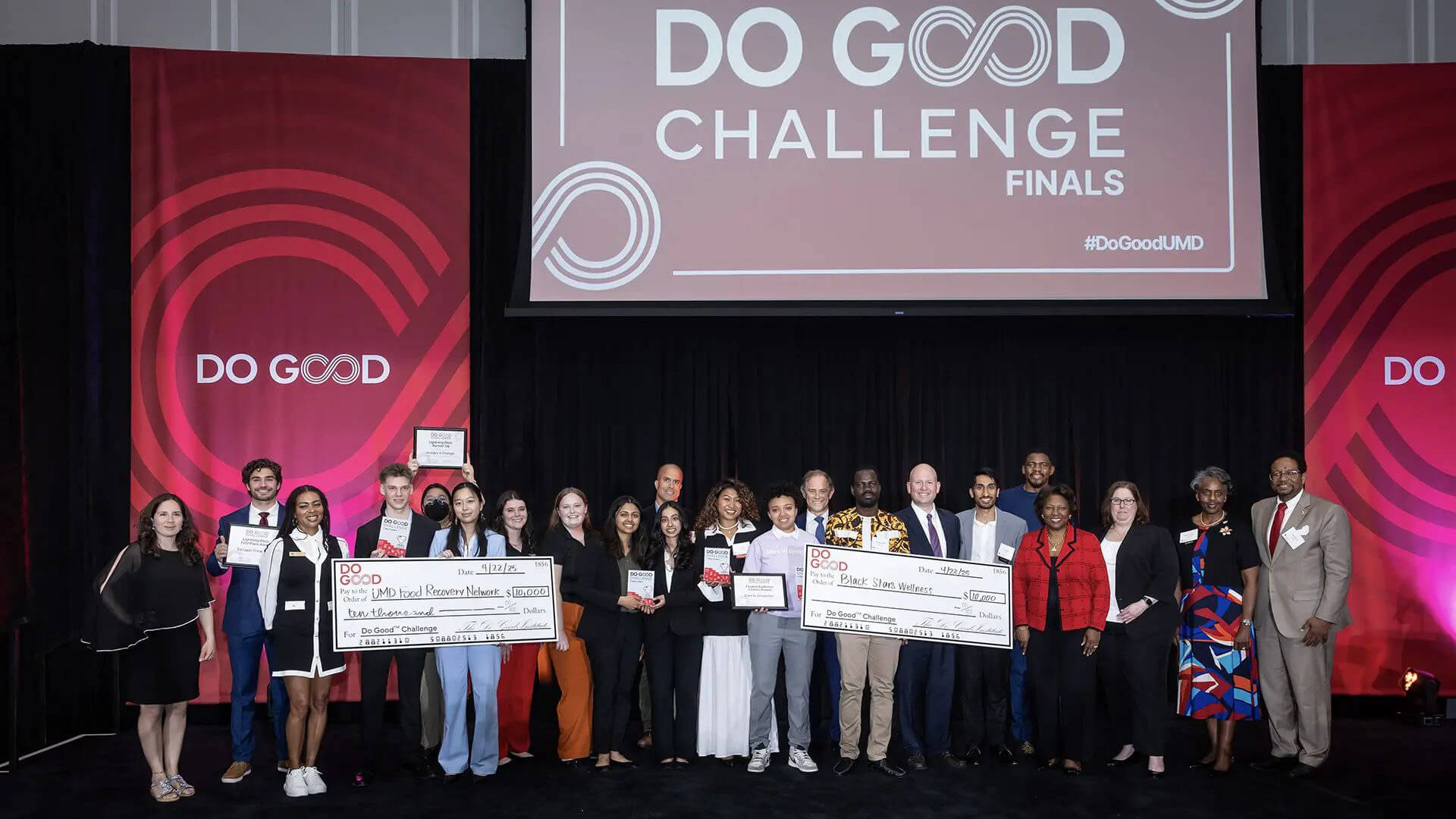
On April 26, six student teams took the stage at the sixth annual Do Good Challenge Finals to compete for a chance to win a share of more than $20,000 in prize money to support their chosen cause or issue. This year’s competition, held at the Clarice Smith Performing Arts Center, saw students raising funds and awareness for a variety of causes ranging from sexual assault to childhood illness to medication waste.
The judges selected Vintage Voices (project track) and the James Hollister Wellness Foundation (venture track) as this year’s winners of the 2017 Do Good Challenge, each group was awarded $5,000 for their cause. Preventing Sexual Assault and Symbiont Health each took home second place and $2,500 for their efforts. In third place, receiving $1,000 each, was Terp Thon and Kodactive.
“The Do Good Institute (formerly known as the Center for Philanthropy and Nonprofit Leadership) launched earlier this year to help make the University the first Do Good Campus,” said Robert T. Grimm, director of the Do Good Insitute. “It’s the essence of the Do Good Campus to enhance higher learning.”
University of Maryland President Wallace Loh took the stage and asked the audience, “Are you fired up for the 2017 Do Good Challenge?” He then instructed the crowd to shout “Do Good” when he raised his fist in the air. Quoting Winston Churchill, Loh said, “You make a living by what you get but you make a life by what you give … at the end of the day, it’s not just your skills and your talents that count. It’s your values and the content of your character and that's why we have the Do Good Institute and the Do Good Challenge.”
The judges for this year’s competition were Sherrese Clark, managing director for Morgan Stanley Private Wealth Management; Kirsten Craft, program manager for the Robert H. Smith School of Business Center for Social Value Creation and 2015 Do Good Challenge Winner; and Rajiv Vinnakota, executive vice president of the Youth and Engagement Division of the Aspen Institute.
Prior to the finals competition, semi-finalists for the Do Good Challenge were able to present their projects to audience members. Each attendee was then able to invest a “Do Good Dollar” to help the team of their choice. Two semi-finalists who received the most Do Good Dollars, Nourish: Mommy and Me, and Running Water, were given two minutes to pitch on stage during the finals. The audience was then able to text in votes for their favorite to win the College of Behavioral and Social Sciences “Be the Solution” Showcase Audience Choice Award.
This year the competition had two tracks: the project track, for student-run initiatives that consisted of volunteering, fundraising and/or building awareness for a cause or organization during the challenge; and the venture track, which featured student-founded and student-run organizations whose efforts during the challenge were focused on taking the organizations to the next level.
Preventing Sexual Assault presented first in the project track. The team explained that more than 4,000 students will be sexually assaulted at the University of Maryland each year. They also noted the mental conditions that could develop as a result of sexual assault. During the challenge, the team held their second annual Occupy McKeldin event, the biggest sexual assault awareness event at the University of Maryland. They also held Real Talk events to engage in open dialogue about sexual assault. The group works to change the culture of sxual assault by educating the community and supporting survivors.
Terp Thon, the largest student-run philanthropic organization at the University of Maryland, hosted year-round fundraising efforts including a 12-hour dance marathon where students stand in support of current and former patient families of the Children’s Miracle Network Hospital. They hosted their annual color run in the fall and saw a 10% increase in participation this year. The group explained they raised more than $1 million for the kids at Children’s National Hospital. They said they would use the challenge prize money to help enhance the color run next year and increase participation at the dance marathon.
The final presentation in the project track was Vintage Voices. The team started their presentation with a song, demonstrating how music is used to help the elderly improve their quality of life. Vintage Voices works to improve the mental health and quality of life for elderly people living in long-term care facilities through the power of music. The group visited elderly care facilities to talk with residents, sing for them and give them iPods filled with their favorite oldies music. They said the $5,000 prize money would help Vintage Voices sponsor 400 residents at more than two communities.
First up in the venture track was the James Hollister Wellness Foundation, an organization that saves viable medications to help developing nations while reducing the toxic pollutants the come from medical waste. They explained that $5 billion worth of medication is destroyed every year and their goal is to take those viable and useful drugs to help those in need around the world.
Next up was Kodactive, an organization that aims to make coding active for kids. The team described the lack of programmers and the gap in education for programmers. Their solution is to create code active kids: Kodactive Kids. The group developed a platform on a cellphone that teaches kids Java through their specially-designed curriculum that uses interactive, immersive and programmable STEM toys. During the challenge, Kodactive raised $6,000 for their cause.
The final venture track team to take the stage was Symbiont Health, an organization the is developing an automated fall detection system to reduce the number of geriatric falls. The team explained the difference between their product and the already-existing Life Alert system, which requires a person to press a button to get rescued after a fall. Their goal is to create something the elderly want to wear.
While the judges deliberated, the audience heard from a Do Good Pioneer Panel, which consisted of Sagar Doshi, business analyst at Deloitte and 2014 Do Good Challenge winner; Kahlil Kettering, urban conservation director at the Nature Conservancy; Dana Priest, John S. and James L. Knight Chair in Public Affairs Journalism; and Jay Smith, director of the Honors College Entrepreneurship and Innovation Program.
In his advice to the audience, Doshi said, “You can do good and do well at the same time.” Priest offered that “confidence can get you so far.” and Kettering said, “You have to combine passion with strategy to get something done and to have impact.”
The College of Behavioral and Social Sciences “Be the Solution” Audience Choice Award Winners were the James Hollister Wellness Foundation and Symbiont Health. The two groups tied and each were awarded $1,500 for their cause.
Nourish: Mommy and Me was awarded the College of Behavioral and Social Sciences “Be the Solution” Showcase Audience Choice Award, winning $1,000 to further their efforts and Running Water received the College of Behavioral and Social Sciences “Be the Solution” Showcase Audience Choice Runnerup Award, winning $750. All teams that participated in the Showcase were awarded $100, including the Bee's Needs, Colleges Against Cancer, Greek Life Serves, Oxfam at UMD, Global Pin, She's the First, Students for the Advancement of Women in Science and The Voice: Juvenile Justice.



